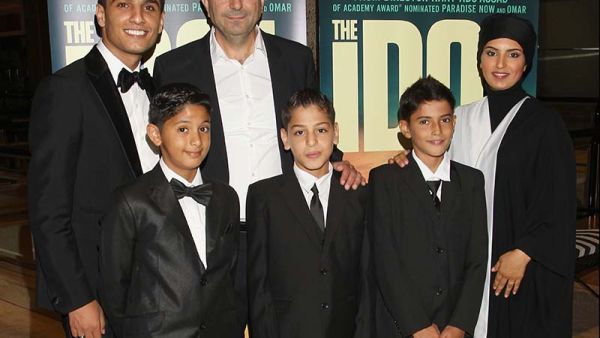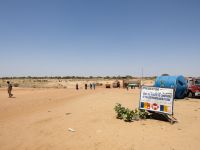The rags-to-riches story can be a compelling cinematic thing. Combining the coming-of-age tale – and with it the potential allure of child actors – with reassuring stories of professional success, despite dire obstacles, the genre has an innate audience appeal. In certain respects “The Idol” (Ya Tayr al-Tayer), Palestinian filmmaker Hany Abu-Assad’s latest feature, has set a new cinematic standard for the Middle Eastern rags-to-riches story.
One reason is the movie’s efforts to maximize certain genre elements.
Take location. Mohammad, the young protagonist, was born and raised in a refugee camp in Gaza – which a decade or so of military incursions and blockade has degraded to become the very embodiment of deprivation. As Mohammad’s mom reminds her son, and the audience, late in the film, “There’s nothing harder than being a Palestinian refugee in Gaza.”
Then there’s the path, to celebrity if not riches. Mohammad doesn’t rise through the ranks of the military, politics or real estate development – occupations that, in the context of the Israeli occupation, are likely to compromise any character’s innocence and undermine his popular appeal – but entertainment.
Like Jamal in Danny Boyle’s 2008 hit “Slumdog Millionaire,” Mohammad finds fame on a popular television program. In this case it’s not a quiz show that tests contestants’ knowledge, but a talent contest – an Arabic-language franchise of popular Anglo-American programs that, since 2001-2, have matched aspiring performers with celebrity judges like Jennifer Lopez and Simon Cowell.
Finally there’s the authenticity factor. A fiction film, “The Idol” is based on the life of Mohammad Assaf, the young Gaza-born performer who arose victorious from the 2012 edition of a TV program called Arab Idol.
Dashing, charismatic and gifted with a silky voice, Assaf rose through the Arab Idol food chain, crooning Arabic love songs and Palestinian anthems, and creating a sensation in conventional and social media, in Palestine, through large swaths of the Arab world and in the diaspora.
Assaf was subsequently made a goodwill ambassador for UNRWA and PA President Mahmoud Abbas granted him a diplomatic passport – markedly broadening the worldly horizons of the little boy from Gaza.
“The Idol” had its Arab world premiere Sunday evening, opening the third edition of the Doha Film Institute’s Ajyal Youth Film Festival. Following the projection at the Katara Theater, Assaf and his ensemble took the stage to perform a set of tunes.
The subject of Abu-Assad’s film makes it a good festival opener, particularly for an event interested in reaching out to younger audiences. It also marks a point of departure for the filmmaker. Best known regionally for “Paradise Now” and “Omar,” decidedly darker thrillers, the director here veers toward something akin to upbeat docudrama.
The second half of “The Idol” depicts Assaf’s meteoric rise through Arab Idol’s audience-driven vetting process. Here Tawfeek Barhom plays Mohammad until the final moments of the movie. His image then abruptly melts away to be replaced by that of Assaf himself. The movie then abandons any pretense of fiction in favor of a news-footage montage of post-victory celebration across Palestine and the Arab world.
In some ways the more compelling parts of “The Idol” are in its first half, in the fictionalized backstory, credited to Sameh Zoabi. This story follows Mohammad (10-year-old Qais Atallah) and his sister Nour (12-year-old Hiba Atallah), Ashraf (Ahmad Qassim) and Omar (Abdelkarim Abu Baraka) as they maneuver Gaza’s dusty streets and pulverized neighborhoods, trying to hustle enough money to buy real instruments for their band.
The film begins with a chase. Some moneymaking scam involving a football and a number of much older-looking boys goes awry, forcing Mohammad and Nour to flee through an outdoor market.
They arrive home in a nick of time, ducking into their room, donning reading glasses and sitting down to their homework.
The sequence is reminiscent of some of the action scenes in “Omar” and it’s not the only time that Mohammad is forced to flee various pursuers, or chase after someone else.
There are plot complications, many of which provide signposts to plot twists in the second half of the film. In an effort to get instruments on the cheap, the kids give their handful for shekels to a dodgy smuggler (Ashraf Barhoum). He takes their money but never delivers the instruments. When Omar visits to ask for a refund, the smuggler has his thugs beat him up. It marks the beginning of Omar’s gradual alienation from Mohammad and Nour.
Mohammad finds a way to make money by performing Quranic recitation. It’s a lucrative line of work, it seems, since he, Nour and their band are soon using real instruments to perform at weddings.
When it’s learned that Nour is sick, Mohammad’s mission changes from pursuit of fame to helping his sister.
“The Idol” has the markings of a Hany Abu-Assad film.
The crew was permitted a mere three-day shoot in Gaza itself, with Jenin standing in for the territory for the balance of the exteriors. These locations are festooned with pancaked concrete structures – mute testimony to the violence of Israeli state occupation – yet not a single Israeli character appears in the film.
This absence – so vexing to those who insist on cinematic “balance” – conforms the filmmaker’s insistence, expressed a decade ago, that Palestinians – not Israel’s occupation of Palestinians – be the focus of this work.
The strongest element of “The Idol” is probably the four Gaza kids who rule the first half of the film. After her turn as Nour, young Hiba Atallah will likely attract the attention of other filmmakers wanting younger characters who are strong and believable.
For all the sweetness and popular appeal of the true-to-life story at its heart, however, “The Idol” won’t be remembered as Abu-Assad’s best movie. It’s a problem shared by those who find real-life stories they want to convey to film and its digital equivalents – whether documentary or fiction filmmakers. Sometimes the actual story is so compelling (and so recent) that it defies and dwarfs efforts to recreate it and carry it to a cinematic level.
At this point, Mohammad Assaf’s is one such story.
This challenge doesn’t completely undermine “The Idol,” of course.
Palestine’s stories of optimism and individual accomplishment find far less international resonance than those of occupation and partisan division, repression, desperation. Weeping mothers slumped over bloody corpses always trump love songs.
At a popular level, there is considerable worth in simply noting the obvious, that these stories do exist.
Hany Abu-Assad’s “The Idol” will have its Lebanon release in January 2016. The Ajyal Youth Festival runs through Dec. 5. For more information, see http://www.dohafilminstitute.com/.








